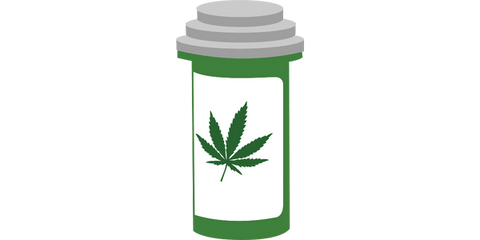It’s June, which means it’s time to get out your rainbow flags for Pride Month.
But Pride isn’t just about big parades, flamboyant outfits, and partying. It’s meant to commemorate the Stonewall Uprising—a series of violent protests for equality that took place in New York City in June of 1969. These important demonstrations helped spread national attention towards the injustices the LGBTQIA+ community faced on a daily basis and helped spark activists around the world to take action.
But what does any of this have to do with weed?
The Intersection Of Two Countercultures

For the zoomers out there who’ve grown up alongside legal marijuana dispensaries and queer representation in popular media, both cultures may seem pretty mainstream. However, as recently as the 2000s, both marijuana use and homosexuality were seen by society as extremely taboo. The American prison system is still literally overflowing with low-level drug offenders caught with marijuana, and same-sex marriage wasn’t federally legal until 2015 when the supreme court made its landmark ruling on the case of Obergefell v. Hodges.
It may seem like just a coincidence that the fight to end cannabis prohibition and the fight for LGBTQIA+ rights happened on a similar timeline, but that’s not the case. In truth, without LGBTQIA+ activists, there would be no medical marijuana and certainly no recreational cannabis dispensaries. The two histories are inexorably intertwined.
Medical Marijuana A Direct Response To The Aids Epidemic

A decade after the Stonewall Uprising, on the other side of the country, the HIV/AIDS epidemic ravaged San Fransancico’s queer community in the Castro District. Since the virus was only perceived to affect homosexuals, there was practically no federal aid coming from the government. Much of the treatment options available were ineffective and came with debilitating side effects that were often described as being worse than the virus itself.
With no relief in sight, many of the infected turned towards marijuana to help assuage symptoms, combat the physical wasting, and make the pain more tolerable. Unfortunately, marijuana was, and still is, considered a schedule I drug by the DEA. The schedule I designation is supposed to be reserved for substances with a high potential for abuse and no medicinal value, though that’s demonstrably not the case with cannabis. For context, cocaine is only a schedule II drug under the controlled substance act.
Marijuana’s legal status made it extremely dangerous for aids patients to safely acquire their medicine. That is until activists like Dennis Peron took action.
Dennis Peron And The Fight For Medical Marijuana

Cannabis has long been associated with protest movements. Marijuana fueled a large portion of the anti-war movement in the 60s and 70s. During this era, Vietnam vet and gay man Dennis Peron got his first taste of direct action by organizing smoke-ins to protest both the war and cannabis prohibition simultaneously. Peron would go on to work with the infamous Mary “Brownie Mary” Rathbun to illegally distribute cannabis to suffering AIDS patients across the Bay Area. Both Peron and Brownie Marie remained steadfast in their endeavor despite multiple arrests and police raids.
Tragically, Peron’s longtime partner Jonathan West died from AIDS in 1990. West had lived with the disease for a considerable amount of time, and Peron witnessed firsthand how marijuana eased the suffering of his dying loved one. After Jonathan passed, Dennis’s activism gained an increased sense of urgency. Within one year, Dennis had facilitated the passing of San Fransico’s proposition P—a resolution that urged the state to legalize medical marijuana. During that same year, Peron also co-founded the San Francisco Cannabis Buyers’ Club, which was in practical effect, the first-ever medical marijuana dispensary in the United States. The boldness in starting such an institution despite the laws against it inspired others like Paul Scott to start their own buyers’ clubs in their communities.
Five years later, Peron would go on to make what would arguably be his largest contribution to the medical marijuana movement. In 1996 Denni co-authored California Proposition 215, also known as the Compassionate Use Act. The ballot initiative sought to legalize medical marijuana officially, and it passed with 5,382,915 votes (55.6%), making California the first state in the union with any sort of medical marijuana program.
Dennis Peron passed away in 2018, but his legacy lives on. This pride month, take time to think about LGBTQIA+ activists like Dennis, who tirelessly worked to end the stigma around cannabis and helped make it more accessible for everyone.


